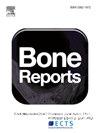Intermittent fasting alleviates obesity-associated impairments in bone fracture healing: Exploring the role of gut microbiome
IF 2.6
Q3 ENDOCRINOLOGY & METABOLISM
引用次数: 0
Abstract
Intermittent Fasting (IF) is a dietary strategy with metabolic benefits that can reverse certain obesity-related pathologies. This study aimed to investigate whether IF can mitigate delayed bone fracture healing associated with obesity. Using cohorts of mice on high-fat or control diets, we applied either an ad libitum feeding or an alternate-day fasting regimen to animals from both diet groups. We assessed bone healing outcomes by evaluating callus mineralization and adipocyte accumulation within the callus through micro computed tomography (micro-CT), histology, and immunohistochemical analyses. Since IF is known to modulate gut microbiome composition, often associated with improvement in various metabolic and inflammatory processes, particularly in high-fat-fed mice, we also explored the microbial community changes in IF mice through 16S rRNA sequencing of cecal samples. Metabolically, IF led to reduced body weight and improved glucose tolerance in obese mice. Regarding fracture healing outcomes, reduced/delayed mineralization and adipocyte accumulation in fracture callus tissue in the high-fat-fed cohort were significantly attenuated when the high-fat-fed mice were subjected to alternate-day fasting. These benefits of IF were not observed in lean mice fed a control diet. Furthermore, IF significantly altered the gut microbiota of mice on a high-fat diet, including an increased abundance of short-chain fatty acid producing bacteria, known for their positive effect on bone density, and a reduction in various pro-inflammatory taxa. While the mechanistic role remains unknown, these findings suggest that the improved fracture healing observed in obese mice following IF may be associated with alterations in gut microbiome composition and function.
间歇性禁食减轻肥胖相关的骨折愈合损伤:探索肠道微生物组的作用
间歇性禁食(IF)是一种具有代谢益处的饮食策略,可以逆转某些与肥胖相关的病理。本研究旨在探讨IF是否可以减轻与肥胖相关的骨折延迟愈合。我们使用高脂肪或控制饮食的小鼠队列,对两组饮食的动物采用随意喂养或隔日禁食方案。我们通过显微计算机断层扫描(micro- ct)、组织学和免疫组织化学分析来评估骨痂矿化和骨痂内脂肪细胞积累,从而评估骨愈合结果。由于已知IF可以调节肠道微生物组组成,通常与各种代谢和炎症过程的改善有关,特别是在高脂肪喂养的小鼠中,我们还通过盲肠样本的16S rRNA测序探索了IF小鼠微生物群落的变化。在代谢方面,IF降低了肥胖小鼠的体重,提高了葡萄糖耐量。关于骨折愈合结果,当高脂肪喂养小鼠隔日禁食时,高脂肪喂养小鼠骨折骨痂组织中矿化减少/延迟和脂肪细胞积累显著减弱。这些益处在饲喂对照饮食的瘦老鼠身上没有观察到。此外,IF显著改变了高脂肪饮食小鼠的肠道微生物群,包括短链脂肪酸产生细菌的丰度增加,以其对骨密度的积极影响而闻名,以及各种促炎类群的减少。虽然机制作用尚不清楚,但这些发现表明,在肥胖小鼠中观察到的IF后骨折愈合的改善可能与肠道微生物组组成和功能的改变有关。
本文章由计算机程序翻译,如有差异,请以英文原文为准。
求助全文
约1分钟内获得全文
求助全文
来源期刊

Bone Reports
Medicine-Orthopedics and Sports Medicine
CiteScore
4.30
自引率
4.00%
发文量
444
审稿时长
57 days
期刊介绍:
Bone Reports is an interdisciplinary forum for the rapid publication of Original Research Articles and Case Reports across basic, translational and clinical aspects of bone and mineral metabolism. The journal publishes papers that are scientifically sound, with the peer review process focused principally on verifying sound methodologies, and correct data analysis and interpretation. We welcome studies either replicating or failing to replicate a previous study, and null findings. We fulfil a critical and current need to enhance research by publishing reproducibility studies and null findings.
 求助内容:
求助内容: 应助结果提醒方式:
应助结果提醒方式:


